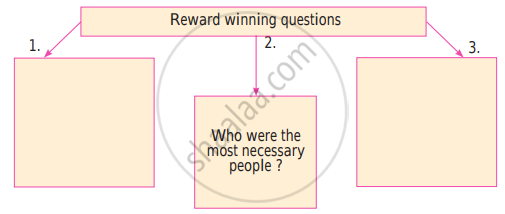Advertisements
Advertisements
Question
Answer the following question.
Do you think the hermit knew, beforehand, not only about the king’s arrival but about the ambush by his enemy? Think a little about this and say what you really feel.
Solution
I think the hermit somehow knew everything before the king arrived. He must have known about the plan of the king's enemy and so was able to deal with it purposefully when the king arrived. News about the ambush must definitely have come to his ears. Otherwise, he would not have been able to answer the king's questions in such a real and practical way. He was a hermit, a wise man, and nothing of importance would have escaped his consideration.
APPEARS IN
RELATED QUESTIONS
Expressions in English classified under different heads. Pair up with your partner, guess, and match the columns. (Use a dictionary.)
| A | B | |
| (1) Principle | (a) | a generally accepted, evident, truth |
| (2) Quotation | (b) | short striking messages for the public |
| (3) Moral | (c) | a short witty remark stating the truth |
| (4) Idioms | (d) | a popular, well-known truth |
| (5) Slogans | (e) | established expressions which do not convey exactly the same as individual words |
| (6) One-liners | (f) | words cited from a speech/text of a famous person |
| (7) Maxims | (g) | a lesson derived from a story or experience |
| (8) Proverb | (h) | a rule to govern one’s behaviour |
Read the polite request/suggestion and complete the gaps in the responses. Make sure they are polite and not repeated.
| May I know the exact time? | Accept (1) ____________ Refuse (2) ____________ |
Read the story and answer whether the following statement is true or false.
The people convinced the King to make a proclamation.
Read the story and answer whether the following statement is true or false.
The hermit spoke usually to everyone.
Read the story and answer whether the following statement is true or false.
The person the King saved and helped was his enemy.
Match the titles with the contents of the proper paragraph.
| 1. | Once a certain king . . . important to do. | a | King gains a friend. |
| 2. | Many learned people . . . time for everything. | b | The wounded stranger. |
| 3. | Equally varied . . . gave the reward to none. | c | King helps the hermit. |
| 4. | When the King arrived, . . . my first attention. | d | The stranger begs for pardon. |
| 5. | The hermit listened . . . continued to dig. | e | The hermit points out answers. |
| 6. | The King turned round . . . gave it to him. | f | Stranger’s vicious intention. |
| 7. | Meanwhile the sun . . . said the King. | g | Questions remain unanswered. |
| 8. | “You do not know . . . all my life. | h | The king received various answers. |
| 9. | The King was very glad . . . the day before. | i | King’s announcement. |
| 10. | “Do you not see?” . . . sent into this life!” | j | The King meets the hermit. |
Complete the Tree diagram associated with the happenings in the story.

Write down in your notebook two points for the following. How do you know?
the king’s enemy was repentant
Answer the following question.
Did the king behave as an ordinary person, rather than as a ruler, at the hermit’s hut? What shows it? Did he also act as a good, kind person? When did he do so?
Consider this list of the different things that happened and rearrange them in the order of time, that is, what happened first, what happened next, and so on. Read the related paragraph again if you are uncertain.
(a) The bearded man resolved to kill the king.
(b) The king went alone to see the hermit.
(c) The king executed the bearded man’s brother.
(d) The king spent the night at the hermit’s hut.
(e) The bearded man laid an ambush to kill the king.
(f) The king’s bodyguards recognised and wounded the bearded man.
(g) The bearded man came out of the ambush.
